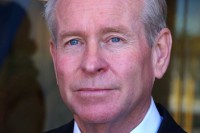Don’t be fooled by Barnett’s Western Power “rethink”
Tuesday 12 Jul 2016If you believe media reports since the Federal Election, you may be thinking Premier Colin Barnett has rethought his plans to privatise Western Power following Malcolm Turnbull’s near death experience over the future of Medicare.
The effectiveness of Federal Labor’s campaign on Liberal plans to privatise parts of Medicare has reminded everyone, including Mr Barnett, of the toxicity of privatisation at the ballot box. The public don’t like privatisation because that it leads to higher prices and poorer quality services.
In his first public appearance following the cliff-hanger election, Mr Barnett was reported as saying, “I don't think the community is particularly accepting of selling Western Power but I will, at a lot of public meetings and discussions, I will try to gauge that as best I can." He said, "I've always been a realist on privatisation. The Australian public is always hesitant about that, and will take some time to accept it,"
While the Premier is clearly moderating his language, it would be a mistake to interpret these comments as the big change of heart that the media is reporting them to be.
Nobody should be fooled by Mr Barnett’s attempts to portray himself as reluctant on privatisation. As both a Minister and a Premier, he has privatised everything he could get away with. As Energy Minister in the Court Government, he privatised AlintaGas and the Dampier to Bunbury Natural Gas Pipeline. He was preparing to sell Western Power before the Liberals were kicked out in 2001.
As Premier, Mr Barnett has overseen the privatisation in our hospitals, schools and prisons, and he is proposing the sale of the TAB, Fremantle Port and Horizon Power, on top of his unfinished business with Western Power.
Colin Barnett is a strong believer in privatisation. But he is an even stronger believer in him being Premier.
In an environment where the Liberal Party is questioning whether he is the best person to lead them to the state election, Mr Barnett has given himself a safety valve. By creating the impression that he is yet to be convinced on the sale of Western Power, he positions himself on the public side of privatisation zealots, like Mike Nahan, as well as Dean Nalder, who is reportedly backed by the pro-privatisation business-lobby.
Presumably, internal Liberal polling is telling the Premier the same thing our polling in Darling Range told us – the planned privatisation of Western Power has the potential to contribute to a big swing against the Liberals at March’s state election.
So, why doesn’t Mr Barnett just junk this policy now?
Because the Liberals’ whole re-election strategy is built around their privatisation agenda.
This year’s state budget optimistically claimed that the sale of Western Power and Horizon Power’s Pilbara poles and wires business would raise about $16 billion in proceeds.
By promising to direct $11 billion into debt reduction, privatisation underpins the government’s financial plan. By promising to spend $5 billion on infrastructure, privatisation is critical to their jobs plan. And, depending on what the list of infrastructure projects is comprised of, privatisation could be key to the government’s transport, health and other policies.
The Barnett Government’s re-election strategy is very similar to New South Wales Premier Mike Baird’s recent successful effort. Mr Baird promised to sell electricity infrastructure and direct the proceeds into debt reduction and carefully targeted infrastructure projects.
This is where Mr Barnett’s “public meetings and discussions” come in. We would expect the Premier to start announcing projects in marginal electorates that are dependent on the sale of Western Power, then campaigning on those projects in those electorates. The Liberals will be hoping that enthusiasm for the projects outweighs the concern people have about the price increases, job losses and maintenance cuts that would result from the sale of Western Power.
The challenge for Mr Barnett is that he is approaching this debate having used up much of his political capital some time ago. Despite being the most popular Premier in Australia, proposing to clean up a financial mess not of his own making, Mike Baird still lost 14 seats when he took privatisation to an election. With a similar policy agenda, Queensland Premier Campbell Newman was defeated after only one term in office.
Mr Barnett’s record managing the state’s finances is a huge disadvantage as he approaches this debate, but his position is made much worse by the potential position of the National Party.
So far, the National Party has not taken an official position on the sale of Western Power, opting to reserve its judgement. The Nationals have clearly been looking at the polls and seeking to differentiate themselves from the unpopular Liberals, on issues such as the privatisation of Fremantle Port. If the Nationals reach the conclusion that the Liberals are beyond saving, they could conceivably seek to save themselves by coming out against the privatisation of Western Power.
If Mr Barnett was publicly locked into the privatisation of Western Power, and the Nationals came out against it, that would be the end of the government.
So, Mr Barnett is being very delicate with his public comments on the privatisation of Western Power, as he has been since the state budget. However, this shouldn’t be misinterpreted as a sign of him being reluctant to privatise, rather as essential to him navigating politics, both within his party room, and within the electorate.
Colin Barnett has unfinished business with Western Power from 2001 and he’ll complete his privatisation program in energy if given the chance, irrespective of what he has said over the last week.

